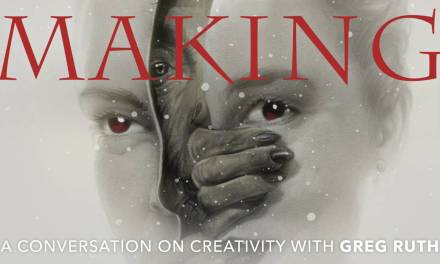Trouble always comes. It’s nice when it doesn’t but life conspires against nice and that’s just the way it is. It’s like what they tell you in driver’s ed. classes: you’re going to get into a car accident, it’s a matter of when not if. So be ready. This post is to help you navigate art crashes.
Okay. So you signed your contracts, and got started on the job and then the first signs of rough waters start bashing against the boat. What’s worse is they get worse and things start going south into a mortal struggle for survival. This extreme is rare in publishing, (far less rare in advertising and film work, fair warning), but it does happen. Sometimes trouble hits and it’s no big thing and sometimes tempers flare, deadlines are blown and all hell breaks loose. Here’s a map to guiding you through the rough times in 7 simple steps.
Life isn’t a video game with a reset button. Once you’re in a pickle, the question is how to get through it rather than winning it. Even the worst possible situation can have a victory hidden within it. I have had jobs fall apart terribly, and I have been ragingly angry at how they unfurl, but keeping my anger in check, or venting it in more appropriate areas always returns good things later. Whether its a young junior editor who then a couple of years later remembers you and how well you conducted yourself when they’re senior editors, or whether it just keep things from getting to hot. Every problem has a solution and its hard to find them if you’re too mad, or getting everyone too mad to look for them. Keep it about the project and not about you or your ego. Eat crow with a smile and avoid going back to that place later, even if you manage to pull off a victory. Make a few extra changes as requested for the sake of the overall project and relationship. Keep calm and carry on. It may feel like the whole world is collapsing when a project is going down, but it’s not. Get your perspective in order, trudge through and do your best. Clients will notice you doing great work in bad situations far more than when you do great work when it’s easy. They’ll remember that and you’ll be better for it career and healthwise as a result of being Fonzi-cool when things get hot.
I don’t love ballistic metaphors, but if you cast the relationship in a war metaphor, the goal of the war is to win the war. The battles are just the means to that end, and losing some battles can assure a war victory more than trying to win each battle mistaking them for the whole campaign. Sometimes your AD has a bad idea about something, and you have to sometimes roll with that, and either find a backdoor way to make them see a different path or just learn to fold the bad idea into an overall good solution. You’re there to complete the whole task. If it’s comics, don’t get lost in a single panel at the expense of the book. Remember the endgame is your having a vibrant and successful career, and reverse engineering that means making vibrant and unique work, fostering good relationships and showing up to meet your deadlines. Keep your ego on the shelf and keep this in mind and it will take you years forward.
Legally they are not entirely different and what that means is that like a marriage, you need to communicate and run a marathon, not a sprint. Like a marriage, the best ones are heavy on communication. Communication is the key, clarity is it’s engine. Not every AD can voice what they want in terms that bring any clarity for you. Don’t be afraid to ask for specifics. SOme AD’s simply want you to be the glove they put their hand into, and knowing this quality early can avoid the inevitable conflict that will come when this fact rears its head later. This is why you date before you get married. Happily though, these metaphorical marriages last only as long as the project. Remember this, and it will give you the strength to survive the marriage if it goes poorly. Be calm, respect each other and be a team, because that’s what you are, even if you don’t particularly care for your teammates. You’ll get a lot more info and behind the scenes secrets that will help you navigate trouble spots this way if you have a friend on the inside. Be loyal and don’t have an affair. No editor gives a rat’s ass about you being late on another job, nor should they. Don’t tell one AD you’re late because you are simultaneously dating another one. They don’t care and they shouldn’t. Also remember the internet is a wide open wonderland, and if you’re late on a job and keeping everyone waiting, but are all over facebook or whatever… they can see this and it makes them mad. And rightly so. You can exhibit all manner of harmless quirks if you show up, do good work and meet your deadlines. You forget the fundamentals of the marriage and your quirks quickly become problems.
Learn the difference and live it. The whole zen master “bend like a reed in the wind” things is true and important. You’re at your strongest when you’re most flexible. The contract says six drawings for a project but it ends up being ten, well, let it be ten. Get an addendum to make sure they pay for that, but be cool about it. You are asked to make changes, make the changes and be amenable. Now this doesn’t mean make every and all changes endlessly. That’s when your bending quickly becomes you being a doormat. Not every editor or AD is blessed with a cogent vision as to what they want. Some have too much so that it’s oppressive. Mark your territory set your limits, even if you only do so with yourself or your home team (your agent, manager or rep), and stick to those lines. This isn’t to say that they won’t cross those lines, and it’s not to say you shouldn’t let them, just make sure that crossing the line is you being flexible and make it harder and more costly to do so if they want to keep pushing that button. In ad or film work you’ll have clauses in the contract that limit how many changes can be made before they start costing money. In publishing there is less of these, but it’s because there’s less a need for these. That isn’t to say when saddled with an AD who has no idea what they’re looking for that they won’t make you run the track a thousand times if you let them. You can discourage this, by letting them know civilly that this isn’t cool with you, or you can also just become less and less responsive. Let the clock run out to your advantage. It’s tactical and not nice but sometimes it’s the only way. Know where your power is and use the right tools of power at the right time and you’ll all be happy. Working in this field is primarily about the relationships rather than the project. Avoid un-fixably bad relationships and cling to the good ones and you’ll be fine. If they know where you stand and know you mean what you say, they will more often than not respect that. They want this to go as smoothly as you do, because they have other irons in the fire to tend to just like you should.
This is usually the toughest one because it requires keeping your emotions in check, and that’s hard when things are bad. Sometimes there is no rescuing a situation and it’s about unwinding it rather than pulling ahead. At that point, the job is over and it’s about landing well. Sometimes the marriage between you, the artist, and they, the publisher was a bad idea from the start, and it took to long to realize it. Sometimes you’re just not the right person for the job, and sometimes they just kill it for reasons never made clear to you. In either case take a deep breath and get intimate with your scream pillow. I myself have yelled to the point of turning red at my good friend and agent, Allen Spiegel rather than yelling at the source of the trouble. He is a dear man for letting me crash my waves against his stony shores and we’re better for it after. I love him for this and it helps me from yelling at my wife and kids as much, and also at my editor or client. That last bit is the most important, because the things I scream at Allen, I would never want said to the perpetrator. Much of it is raw anger or unfettered, unthinking emotion and despair, other times I just get mean. Allen knows it’s not personal and it’s not about him, so he let’s me rant, the client may not. Even a real jerk of an AD isn’t necessarily strong in the face of conflict. I find most don’t even understand the conflict they create or their role in it, and sometimes they do and they’re just powerless to stop it. Often times they are simply the messenger from some turgid committee, and shooting the messenger tends to sacrifice and advocate rather than solve a problem. Overall your legacy is what counts. When you’re doing a job, keep in mind how it could affect or lead to the next job. It’s a lot like driving a car: It veers and pitches wildly when you are looking at the road just in front of the bumper. But when you watch the road far ahead, it’s a smoother ride for everyone. The cost of being a petulant jerk, even in the face of justifiably petulant jerks, always blows back on you. The best thing to do if you’re feeling too hot, is to hang back. Send that email reply tomorrow. Get some sleep. Yell at a friend instead. Even a bad situation can yield loyalty from a publisher if you navigate it professionally. I have had this experience rewarded ten times over when done well and punished when not. Sometimes rocks deserve to be tossed, but every wound you enact wounds you too. Just ask yourself if it’s worth it. Publisher all talk to each other, and you being cool under pressure or being a child who throws tantrums spreads like a virus amongst them. Ask yourself if throwing a stone, however justified, is worth the cost to your reputation. And remember there are TONS of brilliant artists coming up behind you willing to do the job at half the price or less. You serve yourself and your career well to remember that and not give your client a reason to look to them instead of you.
I have a magnet with this on my file drawer from the Newsium, and it is infallible truth. Committees are not your friend, they are no one’s friend really, but you especially are the victim of their madness. I have publishers I now always say no to because I know that despite having great folk working for them, they are enslaved by a committee system that won’t let them do their jobs well. Some are so choke-held that they can’t even make a comment about a piece without consulting an oversight committee. Simple situations become muddy long and drawn out nightmares under this mode. Most committees are not about getting the best work out of the situation, but the safest. Oftentimes they just bend to whomever is barking the loudest, even if they are the most ridiculous. Know that when you take on a committee heavy client, this is what you’re signing up for. Don’t walk into an ad job expecting autonomy anymore than you would find in film work. Fear and blamelessness are the rules, and both court the assumption of failure over success. It’s insane, but it’s true. Just know the landscape you’re about to enter and dress yourself accordingly. Some artists swim perfectly well under these circumstances, others… not so much. Navigating these waters is as much about knowing yourself as knowing your client. But the bigger the company or the bigger the project, the more power the committee has. I have a book coming out from a smallish imprint, but it got a lot of attention and got a prestige bump in the marketing campaign, which led to a big slow down in responses to changes because as more gets invested, more people want to have their voice hear. It wasn’t a terrible thing, though I think it dragged on us all a little, but it came from a good thing: The book was good enough to fret over getting it seen. In say, film, you walk into the door as a slave of a thousand committees on the outset, and largely for the same resons. The more money in this thing, the more people that money brings in. And those people tend to be less interested in the soul of the project than they are at either making money out of it, or not losing their shirt over it. Mostly it’s the latter and boy howdy does that make for a stink parade. I think good people should be left to do their jobs well, and committees don’t do this, so I don’t like them. I cannot honestly recall any situation where a committee made things better, but I also recognize I may be missing some internal mechanisms at the publisher where they did. In any case, committees are here to stay and you’d be best served by learning how to navigate them. Give them less to choose from, or as an old trick, give them one good idea and two bad ones so they feel like they have themselves made the choice to choose the good one. (Be careful though, sometimes they go for the bad idea and then you are stuck).
A lot of ADs or editors are simply the bearers of bad tidings rather than the source. Forgive them for this because it sucks having to be an instrument of an artist’s sadness. They’re people and they get upset and irrational when mad just like you. That said they also know that as a deliverer of bad tidings they must also accept the consequences of your horrors. This is where the sense of trust and familiarity is essential. I’ve had AD’s that simply confessed they have no power to stop what’s happening and aren’t responsible, and they sympathize with your sorrow. This is really helpful actually and it makes you both stronger together. It may not mitigate the trouble, but at least you’re not alone with it. And if you comport yourself well, they’ll remember it. The good ones will usually get out of such a company where this happens chronically, and the company folk won’t. Sometimes it is their fault and that’s when it means using your tools, (your agent or rep) to go over their heads to their bosses to try and calm that poop down. Thing is, when you do this, you are more or less declaring war on that AD or editor. It’s not a path forward to use often andI have only had cause to use it twice in my twenty years. One time led to great things later and we’re all happily working together still. Another ended up resulting in the killing of my book and people getting fired because that over-ridden editor exacted revenge later, cold and mercilessly in pure Klingon fashion. I won a battle and lost the war. So don’t take this as a call to arms for this tactic. It’s a doomsday weapon only to be used at the end of days if ever. Mostly they are working and at the mercy of their superiors just like you are. Show them you understand this and you have an advocate to try and find a way out together. Mistake them for the problem, and you just make more enemies and the problem worse and more lonely.
Overall in closing, know that like any relationship, there will be stumbles and mistakes made. Trouble comes as a consequence of life. We live in a universe ruled by entropy and so it’s inevitable. These difficulties make you stronger and wiser and better if you handle them well. They can also utterly kill your career if you don’t. Consult with your peers, yell at your chair or whatever coping mechanism you have in place. I know tons of genius artists who can’t find work because they are terrible to deal with. That is not to say some of them keep finding work because their awesomeness overrules their personalities or bad business practices, but that is a rarified place few enjoy and it still denies them other opportunities they could achieve if they were better at what they do. Don’t confuse standing up for yourself with being a jerk, take deep breaths and never send angry emails or phone chats without having a night’s sleep on it first. If it comes to a fight, you’ll fight better with a tactical mind than with an angry one. And again, for the love of Pete, don’t go trolling your dramas on the internet. Seriously, that is beyond bad form and always back-baites you more than it harms them.










Hello Greg, wonderful post!
Muddy Colors is my favorite site!
All art and information that I find here has been very important in my life.
Keep up with this precious work!
Mario Augusto
GREAT post, Greg!
Your committee comment reminded me of a book I read years ago by one of the guys who started BBD&O (Batten Barten Durstin and Osborn) Advertising Agency. He was invited to submit a proposal for what would have been a big and profitable project. When shown in, there were several people in the room. They were introduced as The Committee who would listen to his presentation. At the end of a few minutes time, a bell would ring, signaling the end of his presentation. The ad man looked around the room, said “Ring the bell,” and walked out.
Thanks everyone. And especial thanks to our blogmaster, (he doesn't actually make us call him that…. Mostly), Dan Dos Santos for posting this and tracking down these perfectly suited images for the article while i shirk my bi-weekly duties to run around the north coast of Maine. I'm glad it's hitting the right spot!
Overall, i feel like it's my job to provide what i never got coming up and think we should all get in terms of this kind of information. Some folks in our business don't like to talk about this kind of thing, but i believe it ultimately makes things work better for all parties if we can come to the table more prepared. I had to discover many of these truths the hard way, and there's always merit in solving one's own problems… Lessons only being well learned by experiencing them and all that. Nevertheless, i think i could have made fewer avoidable errors had i been able to look to a blog like MUDDY COLORS, and couldn't be more proud to be a part of a collective of such talented and brilliant creatives that we have here.
Great advice as always! I have had the “one good idea and two bad ones” approach bite me in the ass way too often though, and nothing makes for a bad painting like being forced to continue a direction that you were not enthused about in the first place. My current policy is never send a sketch I wouldn't love to finish if at all possible, and if I don't have enough that I love it just means sending fewer or developing further. I've been much happier in my work since doing so. I think this approach is also healthier in maintaining the understanding that everyone wants the project to do well
I just barely dove head first into the whole freelance thing and this has been fantastic advice. Thank you and keep up the great work!
Fantastic post Greg!
Works for musicians as well… just got a change order for a gig as there was a misunderstanding about what is Latino background music and what is Salsa fusion… I read this post this AM, and was cordial to the booking agency who had underbid the project on my behalf not knowing the difference and expense involved… the “committee” had hired Salsa dancers and changed the project… I'm going to take a hit… but agency was pleased that I appeared flexible despite the change… this post came at a good time…
Man, I love this post. So much good advice.
So glad it's all helpful. In reviewing it i noticed an overall tone that seems a bit down, and while i know the post is specifically about the trouble days, i thought it would be wise to note that i have vastly fewer trouble days than successful ones. There's always bumps here and there, but the collective truth is that these are largely rare. To that, the next post will be about the good days, because there's a lot you can do to make them grow or shrink, just like these rough ones. So see you back here in two weeks!
Terrific series of points, Greg; well-articulated with style and a dash of humor. It should be required reading for all of us creative types.
— William Stout
Thanks Bill- its the humor that keeps it from being and endless wave of tragedy. What's that line from Mel Brooks misquoting Winston Churchill? “If you're going through Hell… keep making fun of Satan's underpants.”
Great post with solid advice. (And amazing art! I'm in love with that first one). I learned some of this through the hard way.
“Don't confuse standing up for yourself with being a jerk.”
This is key.